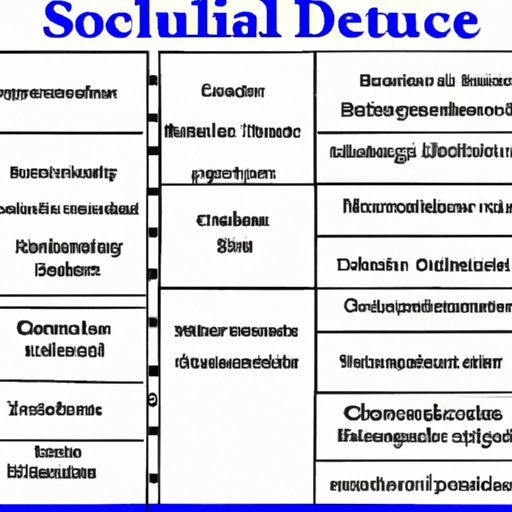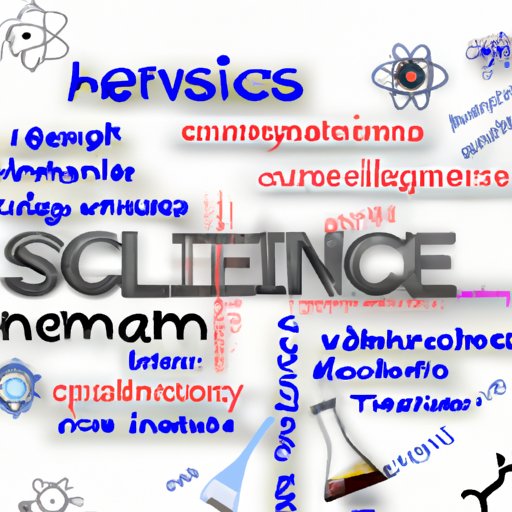Introduction
Science concepts are the foundation of modern scientific knowledge. They are the fundamental ideas, theories, principles, and processes that form the basis of scientific understanding. Most science concepts are complex and often require a deep level of understanding to be fully grasped. But with a little effort, anyone can gain an appreciation for the power of science concepts and their role in our world.
Exploring the Basics: What is a Science Concept?
In simple terms, a science concept is an idea or explanation that is based on evidence and facts. These concepts are used to explain natural phenomena and provide a framework for understanding the physical world. Science concepts come from many different disciplines, including physics, chemistry, biology, and earth science.
The definition of a science concept can vary depending on the context, but generally, it is an idea or principle that is accepted within the scientific community as true. This means that it has been tested and validated through research and experiments. For example, Newton’s Law of Gravity states that every object in the universe attracts every other object with a force proportional to the product of their masses and inversely proportional to the square of the distance between them.

A Breakdown of the Different Types of Science Concepts
Science concepts can be divided into four major categories: physical science concepts, biological science concepts, chemical science concepts, and earth science concepts. Each of these categories contains its own set of ideas and theories that are used to explain natural phenomena.
Physical Science Concepts: Physical science concepts explore the properties of matter and energy. These concepts include Newton’s laws of motion, the laws of thermodynamics, the laws of conservation of energy, the wave equation, and the laws of electromagnetic induction.
Biological Science Concepts: Biological science concepts focus on living organisms and the processes that allow them to survive and thrive. These concepts include Darwin’s theory of evolution, Mendel’s laws of inheritance, cell theory, genetics, and ecology.
Chemical Science Concepts: Chemical science concepts explore the structure and behavior of atoms and molecules. These concepts include atomic theory, the periodic table of elements, chemical bonding, and acid-base reactions.
Earth Science Concepts: Earth science concepts deal with the study of the planet’s physical features, climate, and environment. These concepts include plate tectonics, the rock cycle, the hydrologic cycle, the carbon cycle, and oceanography.
The Significance of Understanding Science Concepts
Understanding science concepts is essential for making informed decisions about the world around us. Science concepts help us to better understand the physical world and how it works, which can then be used to make more informed decisions about the choices we make. Furthermore, science concepts can help us develop new technologies and innovations that can improve our lives in numerous ways.
For example, understanding the science behind climate change can help us make better decisions about how we use energy and resources. Similarly, understanding the science behind genetic engineering can help us make better decisions about how to modify food crops and other plants.
Additionally, understanding science concepts can help us make better predictions about the future. By understanding the principles of physics, chemistry, biology, and earth science, we can better predict the effects of certain events or processes on the environment and our lives.

How to Learn and Apply Science Concepts
Learning science concepts can be a challenge, but it is possible with the right approach. The first step is to develop a solid foundation of knowledge by studying textbooks, watching lectures, and participating in online courses. Additionally, it is important to learn through examples and experiments. This will help you gain a deeper understanding of the concepts and how they can be applied in everyday life.
Once you have a good foundation of knowledge, it is important to practice applying the concepts to real-world scenarios. This will help you develop a better understanding of how the concepts work and how they can be used to make better decisions. Additionally, it is important to stay up-to-date on the latest developments in the scientific community. This will help you keep your knowledge current and ensure that you are using the most up-to-date information when making decisions.

An Overview of Popular Science Concepts
There are a number of popular science concepts that are widely accepted and studied. Here are a few of the most notable ones:
Newton’s Laws of Motion: Newton’s laws of motion describe the relationship between forces and motion. These laws state that an object’s acceleration is determined by the sum of all the forces acting on it, and that for every action there is an equal and opposite reaction.
The Laws of Thermodynamics: The laws of thermodynamics describe the relationship between heat and energy. The first law states that energy can neither be created nor destroyed, while the second law states that the entropy of a system always increases over time.
The Theory of Evolution: The theory of evolution states that all species of organisms have evolved over time through natural selection. This theory is widely accepted in the scientific community and is supported by a wealth of evidence.
The Physics of Sound and Light: The physics of sound and light explore the properties of waves and how they interact with matter. These concepts include the Doppler effect, interference patterns, refraction, and diffraction.
Conclusion
Science concepts are the fundamental ideas and theories that form the basis of modern scientific knowledge. They can be divided into four main categories: physical science, biological science, chemical science, and earth science. Understanding science concepts is essential for making informed decisions about the world around us. Additionally, learning and applying science concepts can help us develop new technologies and innovations that can improve our lives in numerous ways.
This article provided an overview of what science concepts are and why they are important. We explored the different types of science concepts and discussed how to learn and apply them in everyday life. Finally, we provided an overview of some of the most popular science concepts.
By gaining a deeper understanding of science concepts, we can better appreciate the power of science and how it shapes our world. This knowledge can then be used to make more informed decisions and create new solutions to the problems we face.
(Note: Is this article not meeting your expectations? Do you have knowledge or insights to share? Unlock new opportunities and expand your reach by joining our authors team. Click Registration to join us and share your expertise with our readers.)
